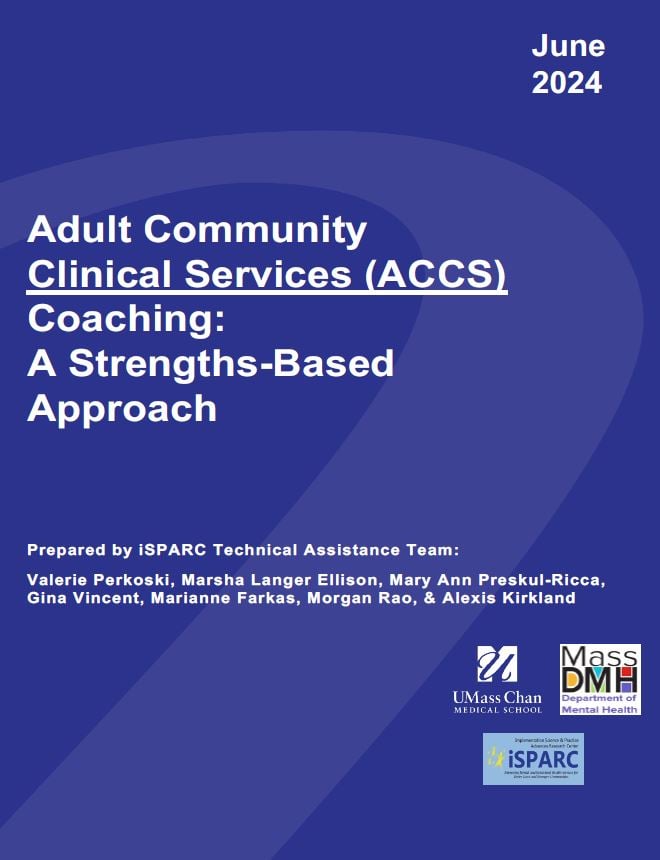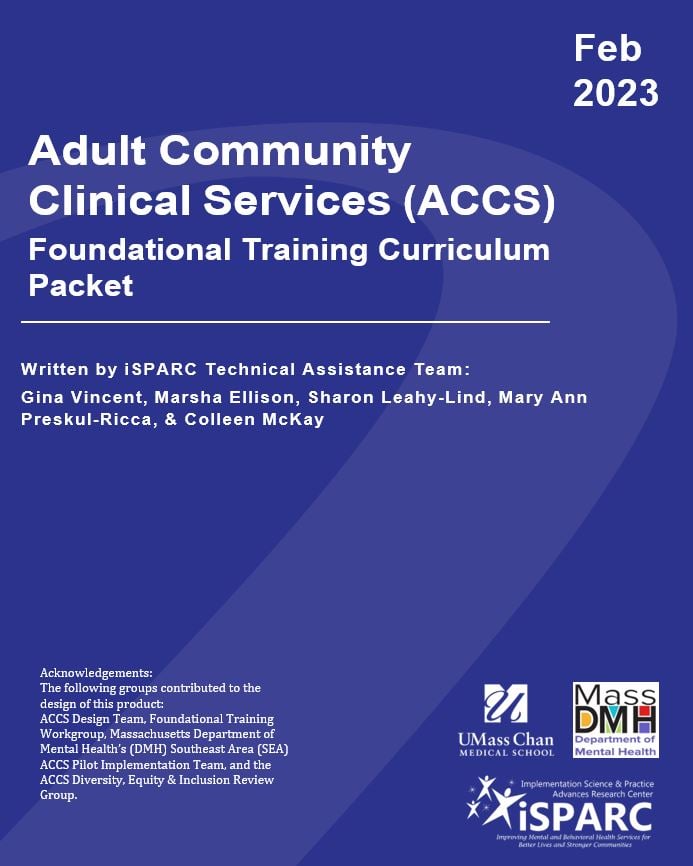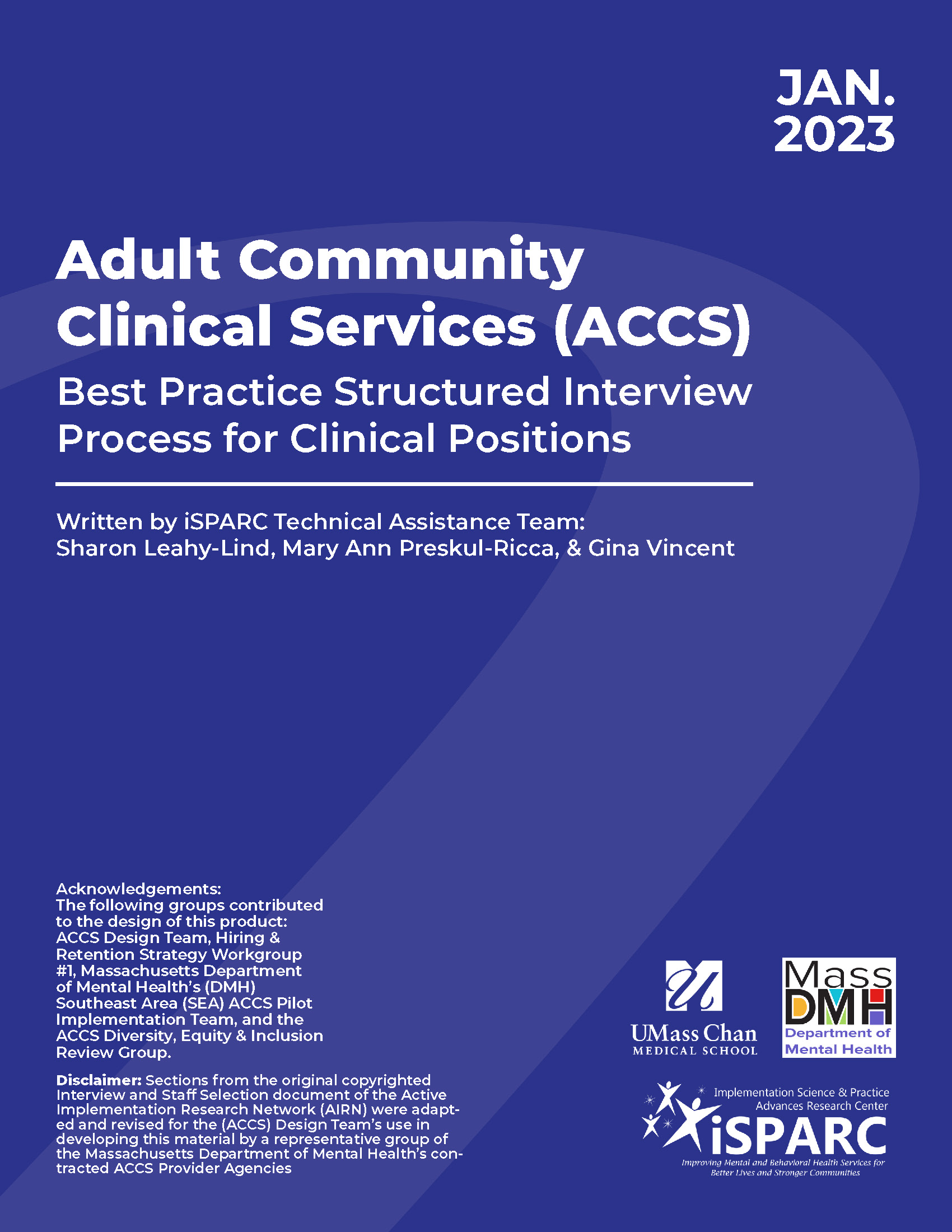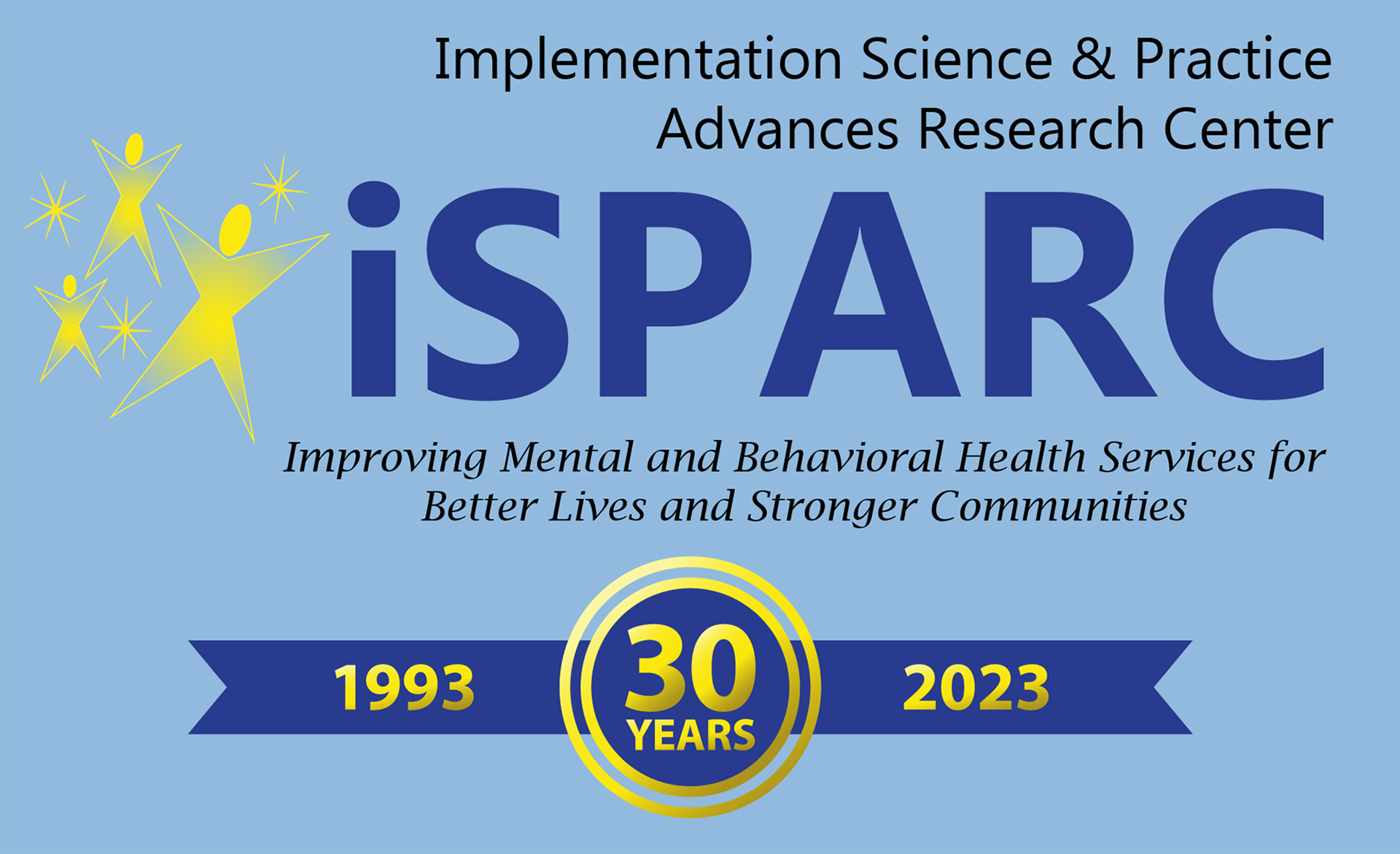Technical Assistance and Consultation Program
This iSPARC program is responsible for providing basic and intensive technical assistance (TA) services to the Massachusetts Department of Mental Health (DMH) and its contracted providers. See our resources and technical assistance request form below.
Adult Clinical Community Services (ACCS) Resources
ACCS Coaching: A Strengths-Based Approach
 The ACCS Coaching: A Strengths-Based Approach manual is divided into 3 parts:
The ACCS Coaching: A Strengths-Based Approach manual is divided into 3 parts:
- Section I defines coaching processes
- Section II discusses strengths-based approaches utilizing personal strengths and the GROW coaching framework
- Section III focuses on measurement via goal scaling
Examples demonstrate how this strengths-based coaching approach may be incorporated within the Massachusetts Department of Mental Health’s (DMH) Adult Community Clinical Services (ACCS) provider agencies to help support staff in achieving individual and organizational goals.
Click below to download the individual form templates:
Form A: A Coaching Model
Form B: Goal Attainment for Individual Goal
Form C: Goal Attainment for Multiple Goals
ACCS Foundational Training Curriculum
 The ACCS Foundational Training Curriculum provides standardized, foundational training for onboarding and orienting all new staff hired to work with the Massachusetts Department of Mental Health’s (DMH) persons served by Adult Clinical Community Services (ACCS). There are ten topical modules and an introduction in this training:
The ACCS Foundational Training Curriculum provides standardized, foundational training for onboarding and orienting all new staff hired to work with the Massachusetts Department of Mental Health’s (DMH) persons served by Adult Clinical Community Services (ACCS). There are ten topical modules and an introduction in this training:
- Integrated Treatment Teams
- Person-Centered Care
- Recovery Oriented Approach
- Coordination with Systems of Care
- Importance of Evidence-based Practices
- Trauma-Informed Care
- Risk Management
- Basics of Motivational Interviewing
- Suicide Prevention
- Substance Use 101
The trainings are designed to supplement the agency's existing training protocols and to ensure all agencies are covering the same 10 areas with new and existing staff. The modules can be downloaded and customized by an agency trainer(s). Each module includes an editable version:
- Detailed facilitator’s guide for the agency trainer explaining how to deliver the content
- Handouts if applicable
- Powerpoint slides
- Pre-post knowledge questions to be completed by participants
Guide for Interviewing, Selecting and Hiring ACCS Clinicians
 This guide describes a process for interviewing and hiring Adult Community Clinical Services (ACCS) clinical staff using best practices. Contact us below by completing our TA form for technical assistance on how to use this packet.
This guide describes a process for interviewing and hiring Adult Community Clinical Services (ACCS) clinical staff using best practices. Contact us below by completing our TA form for technical assistance on how to use this packet.
Click below to download the individual form templates below:
Phone Screening form
Part 1 In-person Interview form
Part 2 In-person Strong Candidate Interview form
Interview Summary Scoring form
ACCS Peer Support Supervision Resources
The following resources were produced by the Massachusetts Peer Support Supervision Workgroup - an independent advisory group facilitated by the DMH Area Directors of Recovery:
The Status of Peer Support Supervision in ACCS, Recommendations of the Massachusetts Peer Support Supervision Workgroup
To explore the status of peer support supervision in ACCS, the workgroup held a series of statewide listening sessions to gather feedback about strengths, challenges, needs, and solutions for peer support supervision. The report reviews the listening session feedback and makes four recommendations:
- A Community of Practice to promote the many strengths of ACCS Peer Support Supervision,
- Guidelines for Peer Support Supervisors providing greater clarity about Peer Supporter Roles,
- Trainings for Supervisors and ACCS Teams focused on Role Clarity and Collaborative Communication,
- A Career Ladder for promoting Peer Supporters into roles as Supervisors, Mentors, and Leaders in ACCS Teams and Provider Agencies
Guidelines for Supervision of Peer Supporters in Massachusetts ACCS, ACCS Peer Support Supervision Workgroup in collaboration with iSPARC
The Guidelines, one of the four recommendations, describes the role of ACCS Peer Supporters and advises Peer Support Supervisors on how to best support and integrate Peer Supporters into ACCS teams. The Guidelines list eleven core values, identify a practice phrase for each value, and suggest separate steps for Peer Supporters and Supervisors to practice the value.
The Guidelines were rolled out to all ACCS agencies via three committees composed of ACCS agency representatives facilitated by four DMH Directors of Recovery and an agency Director of Recovery. iSPARC provided technical assistance to these groups.
Massachusetts DMH Research Center of Excellence TA Request Form
We are here to help the MA DMH workforce with any technical assistance (TA) needs they may have by providing information based on research. iSPARC can provide expertise and information on a wide range of mental health-related topics. We provide Basic TA (e.g., tip sheets, brief phone consultation, etc.) at no cost and can provide more intensive TA (e.g., policy development, training, etc.) which requires approval of your area director or deputy commissioner, or for a fee.
Please note that we do not provide clinical consultation, behavioral services, or referrals. You can contact resources such as NAMI Mass COMPASS at 617-704-NAMI (4264) or by email at COMPASS@namimass.org, or by contacting the William James College INTERFACE Helpline at 617-332-3666, ext. 1411 or 888-244-6843 (website: Interface.williamjames.edu) for resource information and/or provider referrals from a mental health professional.
Please select the type of information you are requesting. We will respond within 3 business days.
